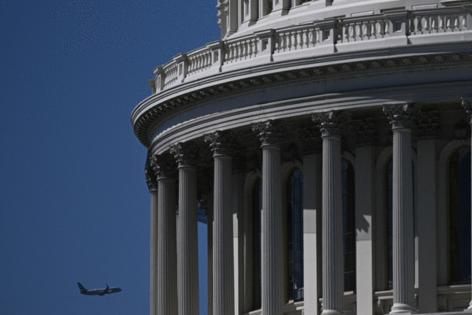GAO, Library of Congress avoid cuts in Legislative Branch bill
Published in Political News
WASHINGTON — Senate appropriators Sunday unveiled a roughly $7.3 billion draft fiscal 2026 Legislative Branch appropriations bill, part of a three-bill package that could be paired with a stopgap spending measure in a bid to reopen the government.
The bill would maintain funding for both the Government Accountability Office and the Library of Congress, two legislative branch agencies that faced steep cuts in an earlier House version of the proposal.
It would also boost Capitol Police funding to $852.4 million for fiscal 2026, an increase of roughly $46 million over the current fiscal year, as concerns over member security remain elevated. The proposal would be a more than 7% increase in total legislative branch funding over the current fiscal year
Not included is language barring the GAO from suing for the release of “impounded” funds without congressional approval, a sticking point in negotiations to advance the package of bills that includes the Military Construction-VA and Agriculture spending proposals.
The language restricting GAO’s authorities appeared in the version that advanced out of the House Appropriations Committee in June, as Republicans were ramping up attacks against the nonpartisan watchdog, which had found that the Trump White House illegally barred the release of appropriated funds.
The proposed restriction on the GAO language was paired with a nearly 50% proposed cut to the GAO’s budget that Democrats viewed as an attack on the legislative branch agency.
“It is astonishing that for all the talk about finding and rooting out waste, fraud, and abuse, that House Republicans would defund the watchdog that is tasked with precisely that role,” said House Appropriations ranking member Rosa DeLauro, D-Conn., at the time.
A Senate version of the bill that advanced out of committee in July and passed on the floor in August would reinstate the GAO’s funding, keeping it flat at $811.9 million for fiscal 2026. But the language over the GAO’s ability to sue the executive branch over “impoundment” — the withholding of appropriated funds from being obligated for purposes intended by Congress — continued to be debated late into this week.
Presidents can cancel funds with congressional approval, as the Trump administration did earlier this year with a $9 billion package to rescind funds for foreign aid and public broadcasting, but the 1974 Congressional Budget Act prohibits the executive branch from doing so unilaterally.
But the Trump administration has also found ways to circumvent the rules in other instances, including with temporary “holds” on targeted accounts. Democrats and some GOP appropriators have pushed back on such maneuvers, arguing it undermines Congress’ “power of the purse” as laid out in the Constitution.
The comptroller general, who leads the GAO, can sue in federal court under the 1974 law for the release of appropriations that have been illegally impounded.
Security boost, Library of Congress remains flat
In addition to the overall increase to the Capitol Police budget, Republican and Democratic appropriators touted $203.5 million in funding dedicated to enhancing security.
Threats against members and staff have been elevated since the first Trump administration, according to Capitol Police figures. But the assassination of Minnesota state lawmaker Melissa Hortman in June and of conservative commentator Charlie Kirk in September have raised concerns across Capitol Hill.
The House announced a new program in July that provided up to $5,000 a month per member to pay for personal security while away from the Capitol. In September, the House doubled the amount to $10,000 a month. And the Senate in September by unanimous consent agreed to a resolution allowing lawmakers to use personal office funds for security enhancements and services.
The Legislative Branch bill released on Sunday would provide $30 million in addition to the Capitol Police annual budget to allow the department to continue its mutual aid program, which is used to reimburse local law enforcement for protecting lawmakers while in their home districts.
The bill would also keep total Library of Congress funding flat at $852.2 million, including the U.S. Copyright Office, the Congressional Research Service and other programs under the library’s purview.
The library faced a period of uncertainty earlier this year when President Donald Trump removed Librarian of Congress Carla Hayden and Register of Copyrights Shira Perlmutter in May. The moves roiled the library and Perlmutter’s firing resulted in a lawsuit that is now before the Supreme Court.
House Appropriators in June proposed a cut to the Library of Congress’ fiscal 2026 budget of roughly 10%. The Congressional Research Service and the U.S. Copyright Office would also remain flat at $136.1 million and $57.5 million respectively for fiscal 2026.
The bill would extend a freeze on member pay that has been in place since 2009. Most members of Congress make $174,000, despite repeated attempts in recent years to provide a cost-of-living adjustment.
It would cut the Architect of the Capitol budget to $811.9 million, down from the $830.2 million enacted for the current fiscal year. It would provide $74.8 million in funding for the Congressional Budget Office, up from $70 million in fiscal 2025.
---------
—Aidan Quigley contributed to this report.
©2025 CQ-Roll Call, Inc., All Rights Reserved. Visit cqrollcall.com. Distributed by Tribune Content Agency, LLC.
























































Comments